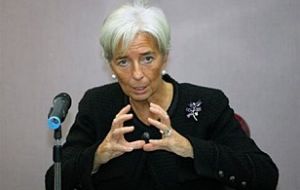MercoPress. South Atlantic News Agency
G8 and Mid East pledge 38bn dollars for Arab spring transition to democracy
 IMF’ Lagarde: the novelty is that “there are many more partners around the table”
IMF’ Lagarde: the novelty is that “there are many more partners around the table” Western and Middle Eastern governments pledged to help Egypt, Tunisia, Morocco and Jordan make the transition to democracy, mobilizing 38 billion dollars of financing, mostly through international lending organizations.
The four countries presented national action plans to develop their economies at a meeting overt the weekend in Marseille, France. Libya sent representatives to the gathering, hoping eventually to join the so-called Deauville Partnership.
The aid is intended to support economies and create jobs as the countries undertake the delicate process of opening up their political systems and holding free elections. The political changes have hurt tourism and investment, at the same time unleashing expectations of better lives.
“We are facing an historical transformational moment, and while there are downsides, there’s enormous enthusiasm,” International Monetary Fund head Christine Lagarde said after the meeting. “It has to be focused on job creation, especially for the young people.”
Lagarde said the fund now recognizes the National Transitional Council as holding Libya’s IMF seat, and she’ll soon send a team to the North African country.
The amount mobilized is up from the 20 billion dollars that was promised at a May meeting of Group of Eight government heads in Deauville, France, which gave its name to the partnership.
Morocco and Jordan have joined initial members Tunisia and Egypt since the initiative was launched at the Normandy resort. Representatives from Saudi Arabia, Qatar, Kuwait, Turkey and the United Arab Emirates, as well as nine international lenders, including the World Bank, the IMF and the African Development Bank, joined yesterday’s meeting.
“What’s the novelty is that there are many more partners around the table,” Lagarde said. “We have donors from international and regional institutions that are engaged in the region.”
French Finance Minister Francois Baroin didn’t give details of the national action plans, and no Arab leaders spoke after the meeting.
The plans “demonstrate a clear and shared commitment to enhanced prosperity for their people supported by the objectives set out in the Deauville declaration: to strengthen governance, foster economic and social inclusion, create jobs and support private sector-led growth,” the final G-8 declaration said.
Libya was an observer at the Marseille meeting. French officials say the new Libyan administration must be in full control of their country and fully recognized as the legal government before it’s inducted into the partnership.
British Finance Minister George Osborne said member states would increase the European Bank for Reconstruction and Development’s lending power to boost its financing in the southern rim of the Mediterranean.
“We want to get some money to the EBRD so it can get going without formal notification, and also a significant bringing together of the resources from all the other development banks,” he said. International lenders could mobilize “tens of billions of dollars” for Arab Spring nations, he said.
Osborne also said he wants expanded trade in the Middle East and for the EBRD “to play a similar role in supporting this region today as it did in the former Soviet bloc countries following the fall of the Berlin wall a quarter of a century ago.”
The European Investment Bank said in a statement that it will lend 7.5 billion to the four member countries through 2013, with 3 billion to Egypt alone. It said it will focus on projects that will create jobs, including microfinance, transport infrastructure and social housing.
The World Bank said it would finance 10.7 billion of projects, the ADB 7.6 billion and the Islamic Development Bank 5 billion. Baroin said French assistance would amount to 2.7 billion.
Tunisia and Egypt have yet to receive more than a fraction of the aid pledged by western and Arab governments to support their transition to democracy, the Financial Times reported on Sept. 9, citing the two nations’ finance chiefs.
Egyptian Finance Minister Hazem el Beblawi said the country had received just 500 million of 7 billion dollars promised by the U.A.E. and Saudi Arabia, though discussions on the remaining funds were ongoing and he expects an agreement by the end of the year, the FT said.




Top Comments
Disclaimer & comment rulesCommenting for this story is now closed.
If you have a Facebook account, become a fan and comment on our Facebook Page!